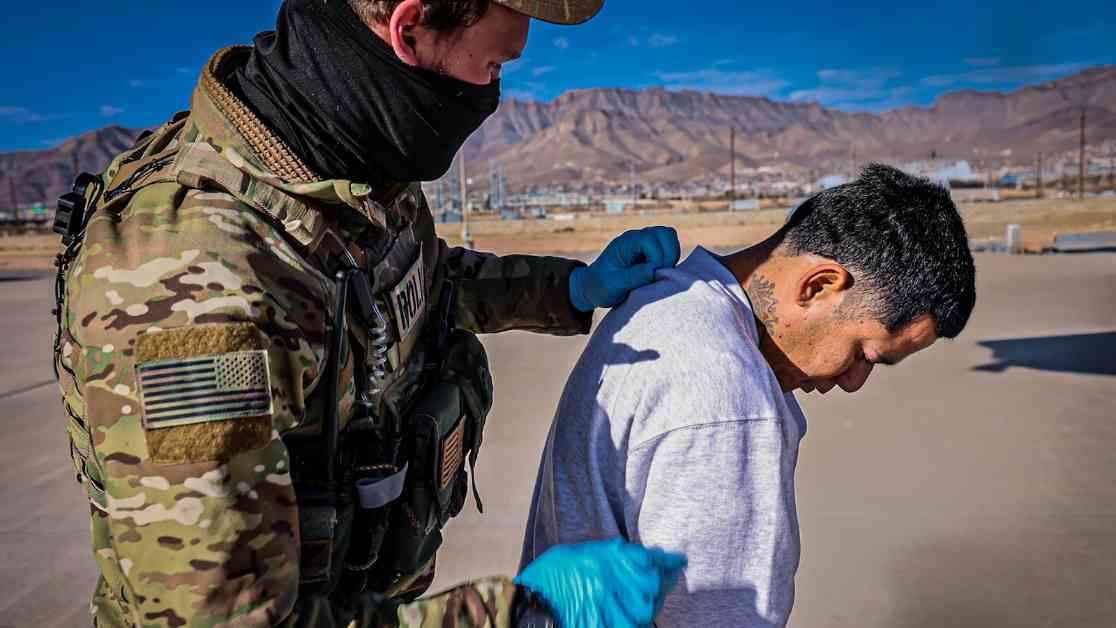The Trump administration’s latest move in the battle against illegal immigration has sparked controversy and raised concerns. The first migrant flight arrived at Guantanamo Bay, carrying individuals described as the ‘worst of the worst’ by U.S. officials. This development has left many questioning the implications and morality of detaining migrants in a high-security prison typically used for al Qaeda detainees.
The flight departed from El Paso, Texas, with a small group of migrants on board, bound for the Guantanamo Bay facility. The migrants, suspected members of the Venezuelan gang Tren de Aragua, landed at 7:20 p.m. ET, marking a significant escalation in the administration’s immigration policies.
Unprecedented Shift in Immigration Policy
President Donald Trump’s executive order on January 29 directed the Department of Defense and the Department of Homeland Security to expand the Migrant Operations Center at Naval Station Guantanamo Bay. This directive aimed to accommodate migrants without legal status residing in the United States. The decision to use this high-security facility reflects a dramatic shift in immigration policy under the current administration.
In a statement from the Oval Office, President Trump expressed confidence in the capacity of Guantanamo Bay to house a large number of individuals. He emphasized the need to address the presence of criminal elements among migrants while adhering to the laws of the land. The decision to utilize Guantanamo Bay for immigrant detention highlights the administration’s determination to crack down on illegal immigration and prioritize national security.
White House press secretary Karoline Leavitt confirmed the initiation of flights transporting migrants to Guantanamo Bay, citing the administration’s commitment to holding illegal immigrants accountable for their actions. The collaboration between various government agencies underscores the seriousness with which the administration views the issue of illegal immigration.
Concerns and Legal Quandaries
Karen Greenberg, director of the Center on National Security at Fordham University School of Law, raised concerns about the practicality of detaining a large number of migrants at Guantanamo Bay. She highlighted the challenges associated with housing such a significant population at the facility, emphasizing the need for careful consideration of legal and humanitarian implications.
Greenberg’s observations shed light on the potential difficulties in managing a sizeable influx of migrants at Guantanamo Bay. The historical context of the facility’s use for detainees and refugees underscores the complexity of the current situation. The need to ensure humane treatment and legal clarity for detained migrants remains a critical issue in the ongoing debate over immigration policy.
As the debate surrounding the use of Guantanamo Bay for migrant detention continues, the concerns raised by experts like Karen Greenberg underscore the need for a thoughtful and comprehensive approach to immigration enforcement. The implications of housing migrants in a high-security prison facility require careful consideration of legal, moral, and logistical factors.
While the details of the charges faced by the migrants on the flight remain unclear, the decision to transport individuals to Guantanamo Bay reflects a significant shift in immigration policy. The administration’s efforts to address illegal immigration through unconventional means raise questions about the broader implications for migrant rights and national security.
ABC News’ Luke Barr contributed to this report, providing valuable insights into the evolving situation at Guantanamo Bay and the implications for immigration policy. As the debate unfolds, experts and policymakers alike will continue to grapple with the complexities of immigration enforcement and the balance between security and human rights.


